 By Pepper Parr By Pepper Parr
January 26th, 2016
BURLINGTON, ON
It was his first serious delegation, one at which he had a concern he wanted to put before city council.
Vince Fiorito, a candidate in the last federal election and a committed environmentalist who spends some of his weekends clearing out rubbish from the city’s creeks, had announced to friends that he was planning on running for city council in his home ward in 2018.
His intention was to spend the next couple of years attending meetings and networking like crazy.
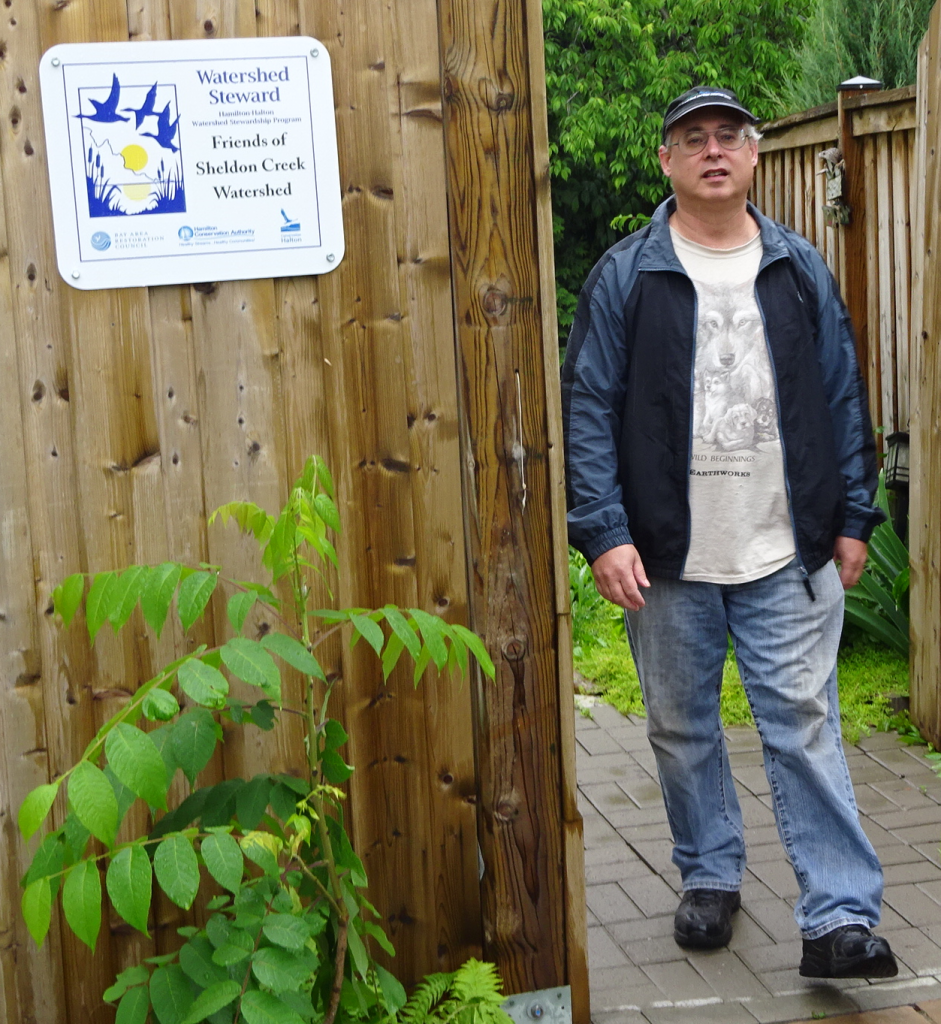 Vince Fiorito was named the Watershed Steward for Sheldon creek. He now wants to become the member of city council for the ward he lives in – Sheldon Creek runs right through the middle of it. Fiorito is the Steward of Sheldon Creek, a title given him by the Conservation Authority, something he takes very seriously.
His delegation to city council was to focus on what he felt was very poor citizen engagement and he launched into his presentation. Less than 18% of the people in this city know about the ways they can be engaged in the civic process he said.
The city treasurer said she was going to inform citizens about the budget but would not be engaging them, advised Fiorito.
He explained that while he as new to the ways of city hall he expected more public participation.
It was at that point that Mayor Goldring interrupted Fiorito and explained that while he could talk about civic engagement he had to confine his remarks to how civic engagement related to the budget that council was considering.
We recall the Mayor interrupting delegations in the past but never on such a fine point,
Fiorito thought he was going to be able to talk about his concerns over the poor level of citizen engagement – the Mayor advised him that he could talk about his citizen engagement but only as it pertained to the budget – which was limiting what Fiorito had planned – but he recovered and went on to make his point – which was that the public really wasn’t in the room when the budget was being discussed
Fiorito was taken aback at first. His first comment was “Gee whiz” as he fumbled a bit to figure out how he was going to get back on track.
He did pretty well – pointing out to council that Seattle had held 38 neighbourhood meetings and involved 30,000 citizens.
This was the kind of thing he wanted to see happen in Burlington.
He also pointed out that there were no evening sessions in the committee meetings that went through the budget in detail.
The Clerk informed Fiorito that there was a planned evening session but no one asked to be a delegate.
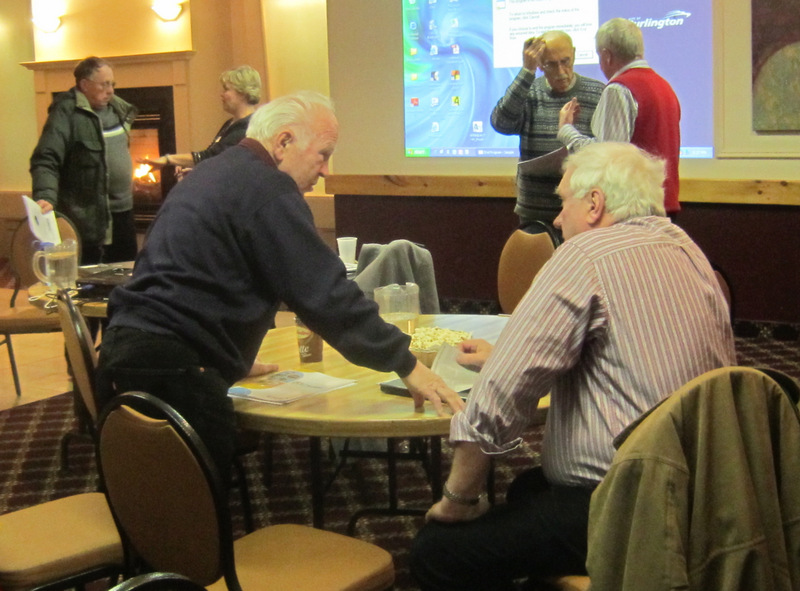 Most of the council members hold meetings in their wards to get local input. A couple of Ward 4 residents discuss a previous budget. Councillor Dennison told Fiorito that he held a budget meeting for ward 4 residents and it attracted more people than the city meeting held at Tansley Woods. Dennison serves water and popcorn – that must be the attraction.
Councillor Meed Ward explained to Fiorito that many people send email to council members directly and questions are answered.
She and the Mayor asked for a link to the Seattle procedures.
There was to be a second delegation from Robert Lovell who had planned on talking about the need for the Free Monday transit for seniors – but he decided not to speak.
Was Lovell spooked by the way Fiorito was cut off by the Mayor?
Was it necessary for the Mayor to interrupt Fiorito? We have heard others go much further off track than Fiorito did without being interrupted.
What was most disappointing was while Fiorito had strayed – this was his first delegation and the Mayor could have cut him some slack. Mayor Goldring did approach Fiorito after the meeting and apologized for having to interrupt and did invite him to meet with the Mayor and discuss his concerns.
What was disappointing as well was that the Mayor could have said that Burlington had some distance to go to pull in stronger citizen participation.
Those that might have watched the live broadcast will probably have concluded that delegating and getting shot down was not something they needed to experience.
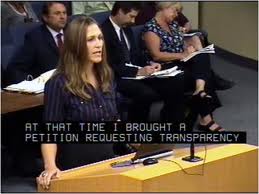 Vince Fiorito, delegating for the first time at a city council meeting brought back visions of the days when Councillor Meed Ward used to delegate and press council on better transparency and more accountability. Fiorito is cut from a different cloth. We saw traces of the original Marianne Meed Ward who delegated several dozen times pressing council to be more transparent and accountable before she was elected to office. And she began her climb to those august chambers several years before the 2010 election.
Fiorito seems to have decided to use the same approach. He will be worth watching. And don’t expect him to get tripped up again by the Mayor.

 By Staff By Staff
January 25th, 2016
BURLINGTON, ON
The residential tax rate for 2016 is going to be $17.10 per $100,000 of home assessment value.
City council approved the 2016 budget this evening which came in at an increase of 3.19% more than 2015.
Additional details will be published early Tuesday.

 By Staff By Staff
January 25, 2016
BURLINGTON, ON
Halton Court Services is committed to providing our customers with the best service possible. Please take a few minutes to complete our customer service survey.
 Your comments will help us to see how we’re doing overall and where we can make improvements. Your comments will help us to see how we’re doing overall and where we can make improvements.
The response to this service will depend on whether one is a plaintiff or a defendant.
They are asking what you think – if you want to respond CLICK here.

 By Staff By Staff
January 25th, 2016
BURLINGTON, ON
Ontario is taking action to combat contraband tobacco and keep our communities safe by creating a new Contraband Tobacco Enforcement Team within the Ontario Provincial Police (OPP).
Located within the OPP’s Organized Crime Enforcement Bureau, the new team will be dedicated to investigating the smuggling and trafficking of contraband tobacco and will work closely with local, provincial, national and international enforcement agencies to combat and eliminate sophisticated contraband tobacco networks across Ontario.
 There are very few young men in high school who cannot tell you where to buy illegal cigarettes. The team will also work with the Ministry of Finance’s tobacco tax enforcement staff by sharing information and collaborating on contraband tobacco enforcement investigations. The Ministry of Finance will continue to provide tobacco enforcement through audits, inspections, and investigations.
Tobacco consumers should be aware that:
All legal cigarettes sold in cartons or packages have a legal yellow ‘ON Duty Paid Canada’ Ontario tobacco stamp, with only certain limited exceptions.
It is illegal to buy, possess or distribute untaxed cigarettes without proper authorization.
Punishment includes civil penalties, fines, and in some cases, jail time, depending on the quantity of contraband tobacco and conviction history.
Addressing contraband tobacco continues to be a priority for Ontario. Low-cost, contraband tobacco undermines provincial health objectives under the Smoke-Free Ontario Strategy, results in less tobacco tax revenues for critical public services our communities and families rely on, and compromises public safety through links with organized crime.
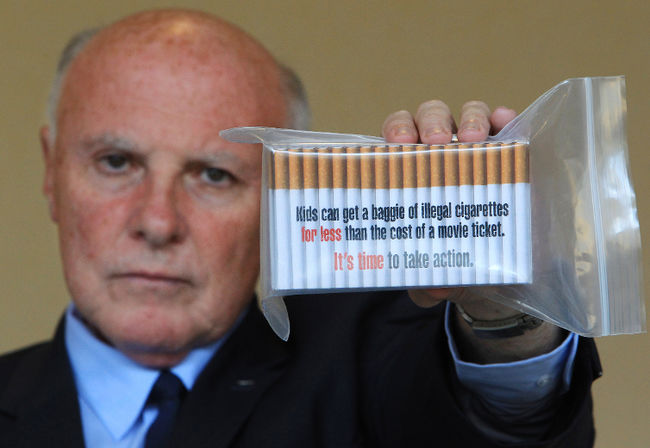 Gary Grant is the national spokesperson for the National Coalition Against Contraband Tobacco. He is also a decorated retired police officer with the Toronto Police Service and current director and founder of Toronto Crime Stoppers. Since 2008 more than 252 million contraband cigarettes, 4.1 million untaxed cigars, and 169 million grams of untaxed fine-cut or other tobacco products have been seized by the Ministry of Finance.
The RCMP estimates that 175 criminal organizations are involved in contraband tobacco in Canada, and it is believed that many use it to finance more serious illegal activity, like drug and weapon trafficking.
Being caught in possession of a single pack of 20 contraband cigarettes will cost the purchaser $108.The fine for 50 cartons or baggies is $4,693 and possession of any more could send you to jail.
Anyone can anonymously report cigarettes being sold illegally, to Ontario Crime Stoppers at 1-800-222-8477, or online at TipSoft.
The provincial government seems to be more interested in stopping the sale of cigarettes on which they cannot collect taxes.
 If doctors said they were OK – then they had to be – right? Those same doctors then earned fees for trying to cure the lung cancer. After years of allowing the sale of a product that has had a devastating impact on the health of people who decided to smoke the province increased the taxes which created an opportunity for the criminal community to move in and sell cheap cigarettes.
 This dashing young man went on to become the President of the United state – don’t recall him every saying his promoting tobacco was something he regretted. The advertising and marketing community earned very fat fees for coming up with advertisements that convinced us smoking was cool, hip and the thing to do – and we still have tens of thousands of people who are still smoking. Those same advertising people have not managed to come up with advertisements that change the behaviour.
There are a whole bunch of conflicting purposes and agendas here – and I think the young people see it for what it is – hypocritical.
Related article:
Top cop rolls into town in a limo to tell media about the ills of illegal tobacco.

 By Pepper Parr By Pepper Parr
January 25th, 2016
BURLINGTON, ON
It is recognized as one of the most important dance productions ever mounted by Canada’s Royal Winnipeg Ballet, the highly-acclaimed Going Home Star – Truth and Reconciliation.
It will be on the stage of the Performing Arts Centre for one show on February 4, 2016. Book tickets here.
 Royal Winnipeg Ballet dancers Sophie Lee and Liang Xing perform a Pas de Deux in Going Home Star “This is an amazing opportunity for our patrons to see this production,” said Suzanne Haines, Executive Director of The Burlington Performing Arts Centre, “we look forward to welcoming the Royal Winnipeg Ballet to Burlington.”
Described as “searing and sensitive,” this ” emotional classical ballet” was first envisioned by the late Cree elder-activist Mary Richard and RWB’s Artistic Director Andre Lewis. “We aim to boldly continue our mission to teach, create and perform outstanding dance with intent to entertain, inspire and move audiences and present works that resonate beyond the walls of the ballet,” adds Lewis.
Going Home Star – Truth and Reconciliation was created with the guidance of the Truth and Reconciliation Commission of Canada and members of the Aboriginal community. Through stunning storytelling and captivating dance, this deeply moving ballet explores the powerful stories, both told and untold, of survivors of the Indian residential school system. The ballet explores the world of Annie, a young, urban First Nations woman adrift in a contemporary life of youthful excess. Annie feels strangely disconnected within her superficial loop. But when she meets Gordon, a long-haired trickster disguised as a homeless man, she’s propelled into a world she’s always sensed but never seen.
 Royal Winnipeg Ballet dancers Sophie Lee in Going Home Star Together, Annie and Gordon travel the streets of this world as well as the roads of their ancestors, learning that without truth, there is no reconciliation.
Going Home Star – Truth and Reconciliation is a representation of the many stories, both told and untold, by Indian Residential School Survivors and their families. The creative team that brought this story to life includes renowned choreographer Mark Godden, Canadian novelist and TRC Honorary Witness Joseph Boyden, Cree actress, former Member of Parliament, and TRC Honorary Witness Tina Keeper, Canadian multimedia artist KC Adams, accomplished costume designer Paul Daigle, and Juno Award-winning composer Christos Hatzis with Polaris Prize-winning Inuk throat singer Tanya Tagaq and Steve Wood and the Northern Cree Singers.
“Going Home Star – Truth and Reconciliation may be the most important work mounted by the Royal Winnipeg Ballet in its illustrious 75-year history,” boasts Robert Enright, of CBC News.
The Truth and Reconciliation Commission of Canada (TRC) was established in 2008 to tell Canadians about the history of Indian Residential Schools and the impacts it has had on Aboriginal children who were sent to the school by the Canadian government and to guide a process of reconciliation between and within Aboriginal families, communities, churches, governments and Canadians.
The TRC has a five-year mandate under the direction of the Chair, The Honourable Justice Murray Sinclair and Commissioners Chief Wilton Littlechild and Dr Marie Wilson.
The creation of the Residential Schools is one of the blackest marks on Canadian history. It is something for which we are all responsible -and it is up to all of us to repair as best we can the damage we did and make way for the aboriginal First Nation’s people to become what they have always been meant to be.
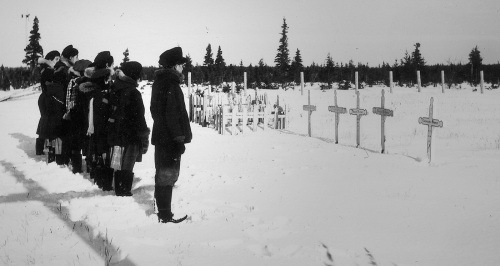 It happened – we did this to these people – a process of Truth and Reconciliation can heal some of the wounds and repair some of the damage. Going Home Star was commissioned by Artistic Director André Lewis; the production explores the world of Annie, a young, urban First Nations woman adrift in a contemporary life of youthful excess. But when she meets Gordon, a longhaired trickster disguised as a homeless man, she’s propelled into a world she’s always sensed but never seen. Not only do they travel the streets of this place but also the roads of their ancestors, learning to accept the other’s burdens as the two walk through the past and toward the future.
Together, both Annie and Gordon learn that without truth, there is no reconciliation. Based on a story by award winning Canadian author, Joseph Boyden. The Royal Winnipeg Ballet is one of the world’s premier dance companies, founded in 1939.
Prior to all Dance Series performances join us in the lobby for pre-show chats by
Gary Smith, Hamilton Spectator – Ballet Review – Dance International.
Post-show talk backs will also take place, with various Artistic Directors and/or Company Members.
Ticket prices:
Regular Price: $59 + $2.50 Fee and HST (You Pay $69.50)
Senior Price: $47.20 + $2.50 Fee and HST (You Pay $56.17)
Youth/Child Price: $25 + $2.50 Fee and HST (You Pay $31.08)
Series Price: $53.10 + $2.50 Fee and HST (You Pay $62.83)

 By Staff By Staff
January 25, 2016
BURLINGTON, ON
Burlington’s Will Finch, the record-setting, fourth-year quarterback of the University of Western Ontario Mustangs is calling it a career.
 Will Finch – A Nelson High graduate who went on to Western where he broke most of the existing records. Finch was one of the Canada’s most highly sought after recruits when he graduated from Nelson High School in 2012. He led the Lords to an undefeated 12-0 season, and the Golden Horseshoe Bowl title in 2011.
One of London’s best known athletes, one whose concussions have sidelined him before, is retiring to avoid risking further injury. Each of his last three seasons has been interrupted by injury. He missed the end of the 2014 and 2015 Ontario University Association seasons because of concussions.
 A remarkable football player who had a remarkable career. The awareness of the impact of brain injuries on athletes at all levels has grown dramatically in recent years, underscored by the 2015 Hollywood movie “Concussion.” The film is about Dr. Bennet Omalu, a pathologist, who uncovered the truth about brain injuries among players in the National Football League.
In Canada, Leo Ezerins, Executive Director of the Canadian Football League Alumni Association, and Toronto Rehab and Toronto Western Hospital have been at the forefront of research into brain injuries for the past seven years. and Toronto Western Hospital have been at the forefront of research into brain injuries for the past seven years.
Caused by blows to the head or violent hits to the upper body, common in contact sports, the effects of concussions are usually temporary, but can range from headaches and problems concentrating, to memory and balance problems.
In London, medical professionals have been on the cutting edge of concussion research and treatment. The Fowler Kennedy Sport Medicine Clinic, founded in 1974, has had more than 2,000 visits by hockey, soccer, basketball and football players with sports concussions.
Dr. Henry Svec, a psychologist who operates the Dr. Svec Institute and Rehabilitation Clinics in several cities in Southwestern Ontario, and a former Mustang football player who deals with traumatic brain injuries, called Finch’s decision, speaking as a fan and alumni, a “courageous one.”
But Svec said too often not enough is done to diagnose the severity of a concussion and not enough recovery time is allocated for the brain to heal and rehabilitate after an injury.
 Will Finch – he had a great arm and an even better eye – always knew where the ball had to go. In his four years at Western, Finch played 30 regular-season games — completing 533 of 790 passes for 8,243 yards, 57 touchdowns and 24 interceptions. He also had more than 1,200 yards rushing. In six playoff games, he had 1,372 yards passing. — completing 533 of 790 passes for 8,243 yards, 57 touchdowns and 24 interceptions. He also had more than 1,200 yards rushing. In six playoff games, he had 1,372 yards passing.
His best season was 2013-14 when he played in all eight regular-season games and three playoff games. In the regular season, he completed 191 of 274 passes for 3,047 yards and 21 touchdowns, with six interceptions.
 Will Finch In the playoffs he completed 48 of 78 passes for 576 yards and three touchdowns. He set an Ontario University Athletics record with 3,047 passing yards, and a 69.7 completion percentage. He was the 2013 OUA most valuable player and Hec Crighton Trophy nominee.

 By Pepper Parr By Pepper Parr
January 22, 2016
BURLINGTON, ON
It’s called being between a rock and a hard place, The rules will ‘get ya’ every time.
Your city council and the staff at city hall will say, whenever they get the chance, that they are always transparent and always accountable and that they are there to serve the people of the city.
The words “citizen engagement” are sprinkled throughout the Strategic Plan that is working its way through the bureaucracy.
Look at this situation and see if you can find the transparency or the accountability or even a smidgen of citizen engagement.
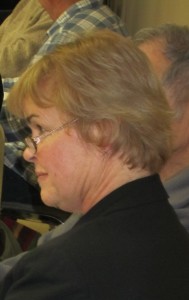 Director of Finance Joan Ford does a great job of providing the data. Burlington has a very good finance department; some of the most diligent people on the city payroll work in that department. They usually always have their fingers on whatever number a member of council might want. Whenever Treasurer Joan Ford doesn’t have a number at her finger tips or makes a small mistake she actually blushes with embarrassment and correct the error very quickly.
Our only beef is that the finance people are not particularly interested in engaging the citizens of the city – they are interested, and are very good at informing the public. These are two different approaches to civic government.
But that is not the current issue. The finance people set an aggressive agenda to get the 2016 budget completed. Debates on the budget take place within a Standing Committee.
Staff set out several days for the process of budget delegations and debate to take place.
Tuesday, January 19th: 10:30 to 6:30 – the meeting ended just after 4:30 pm
Wednesday January 20th: 10:00 am to 4:00 pm.
Thursday January 21st: 3:00 pm to 5:30 pm. This meeting did not take place; the Standing Committee was able to adjourn at 4:00 on the Wednesday when they set they recommended a tax increase of 3.16%
Delegations were held on the Tuesday during the day. For some reason they saw no reason to hold evening sessions- why not?
Why wasn’t there more in the way of public notices – the Gazette would have cheerfully run an advertisement for the city had they chosen to use our medium – which gives better value than any other media in the city – but I digress.
The delegations were strong, factual and well delivered and members of council certainly engaged those who were on hand to speak.
The Council debate took place the following day – the Gazette and the Spectator were the only media present.
It was a good debate – we saw some staff behave in a very disrespectful manner when a member of council put forward some data that was supplied by Oakville on their Free Monday for seniors program. A city Director came very close to saying he didn’t believe the numbers read out to him from the Oakville Director of transit. Our city manager, a former Canadian Armed Forces Captain, knows what insubordination is, quite why he didn’t intercede is a question he might want to answer.
When it came to a vote – those wanting the Free Monday transit for seniors lost on a 4 against – 3 for vote.
Councillor Craven is reported to have told an Aldershot resident that he liked the program – but he did not vote for it – that may have been because almost anything Councillor Meed Ward puts forward, Craven opposes. He didn’t speak at any length on the matter during the debate.
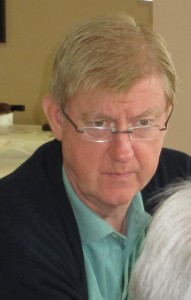 Councillor Paul Sharman voted no – he wanted more data. Councillor Sharman always wants more data before he makes a decision – there does come a point when a decision has to be made based on experience and wisdom. There was the sense that the asking for additional data was punting the ball off the field.
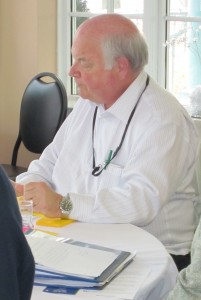 Councillor John Taylor – he voted no – saw free transit as social welfare which most people didn’t need. Councillor Taylor couldn’t help but see Free transit as some form of social welfare; his mind is still stuck in that old style thinking.
One wonders why Taylor does not label the $225,000 that is forgone in terms of parking fees for the free parking members of staff get every year. With that kind of money the city could make the transit service free to everyone.
Votes can be changed at city council; members can change their mind when they have new information.
But here is the rub. If council votes a second time on the budget matter of free transit for seniors on Monday’s and the vote is lost a second time – it cannot be brought back to council again for the balance of the term of office of this council – two and half years, unless the motion is brought by one of the people who originally voted against the motion – and that vote must pass with a 5-2 for vote just to get it on the table.
That is a high hill to have to climb and would make anyone who wanted to attempt to have the vote over turned at council think twice. Forcing the vote kills the opportunity for the balance of this term of office – which we suspect is exactly what some of the Councillors wanted.
A wiser mind would get into discussions with any member of Council they thought could be swayed – and if the votes were not there – then go to ground and wait for the right opportunity.
There is nothing to prevent council from asking the transit people to prepare the document that would set out what the metrics would be to measure a successful pilot program.
At one point Director of Transit said he could have the document done in a day – when pressed a bit he said he would need a couple of weeks.
 Transit Director Mike Spicer, in the yellow shirt, shows Mayor Goldring what he wants in the way of new buses. The pilot program wasn’t due to start until April – so Mike Spicer, the Director of Transit has all kind of time to prepare a report – he might use some of that time to meet with his peer in Oakville and learn just how they made their program work.
There is a sliver of hope for the program. Mayor Goldring suggested that the transit people might want to use the pilot project as a marketing initiative – their response to that was they already had a number of marketing programs.
And how well are they working ? is a question the Mayor might have reasonably asked.
Rick Goldring doesn’t yet fully understand what it is to be a Mayor – as the Chief Magistrate he has a “bully pulpit” which he hasn’t learned to use. He could have and should have asked the Director of Transit to re-think his response and then invite the City Manager and the Director in for a cup of coffee and a chat.
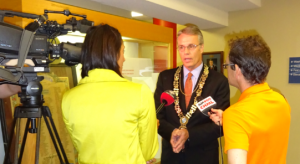 Mayor Rick Goldring on one of the few occasions that he wore his chain of office during an interview. During the debate James Ridge, City Manager, wouldn’t touch the question. He said – and he right – “this is a political decision.”
That chain of Office the Mayor wears isn’t just a piece of bling. It is a symbol of the office he holds and the authority given him.
There was an opportunity to do something bold, something visionary and, in the words of Jim Young, a chance to show Burlington as a caring, conscientious community.

By Pepper Parr
January 22, 2016
BURLINGTON, ON
A funeral at a Performing Arts Centre? Well first it wasn’t a funeral – it was a celebration of the life of Thomas Sutherland – everyone in the theatre knew him as Tom.
It wasn’t a sold out event but it was better than many of the events for which tickets are sold.
A good 450+ were in their seats to listen to people who loved Tom dearly and wanted to talk about him before his passing in a very sudden death that no one was ready for begins to be forgotten.
His children Kirsten, Derrick and Matthew were there as were his grandchildren: Noel, Gavin, Oland and Jamie.
Walter Mulkewich asked the audience to “grieve the loss of a good man”.
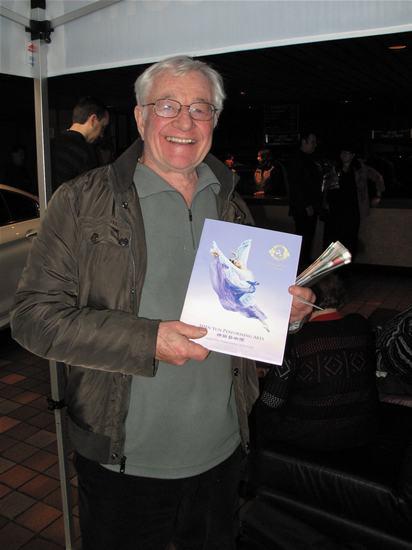 The arts were a big part of Tom’s life – he was an active supporter of the Performing Arts Centre and what was the Burlington Cultural Centre when he first got involved. I didn’t know Tom all that well – we would cross paths – we were both big L liberals and believed in the cause.
I last saw Tom at the Liberal Christmas Party at the Polish Hall. He was his usual loquacious self. I sort of knew he sang but wasn’t fully aware of the roll music played in his life.
That evening he sang and had MPP Eleanor McMahon joining her voice with his. I thought at the time – we are going to hear more of these two. McMahon likes to ham it up and, if one was to believe all that was said at the celebration of Tom’s life this afternoon – Tom was a born arm twister, could sell ice cubes to Eskimos and encyclopedia’s to people who didn’t know they really needed a set of the books until Tom got in front of them.
He sold the Spectator on the corner of King and James in Hamilton when he was a couple of sizes above a sprout – and as his sister told that story you could almost hear him calling out: Extra, Extra – real all about it in the Spectator. There was a time when that was the way newspapers were sold.
Tom did it all –and he did it his way. He loved to take the Frank Sinatra songs and sing his heart out. During the video that was played on Tom with all kinds of pictures there was his voice. I found myself asking if that was Tom or Frank himself.
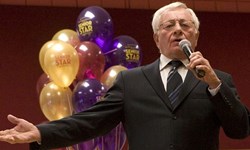 Was he singing or was he giving a speech? For Tom Sutherland they were one in the same – he did prefer the singing. The remarks made by the several people who spoke were more political than I expected and were, I suspect, a significant change for Burlington. The Liberals have only held the two seats for just over a year.
Tom ran federally again Bill Kempling in 1978 and again in 1980; he was the kind of guy who couldn’t pass up on an election campaign. Both MPP McMahon and MP Gould spoke entertainingly about their door to door experiences with the man.
One of the highlights of Tom’s personal political career was the occasion he got to introduce then Prime Minister Pierre Trudeau
He was clearly loved and treasured – he was a one of 11 children – with five of his brothers passing before him.
His sister Loretta spoke of the occasions when the family would be at the pier on the Beach in Burlington – no not the one we paid $14 million for – one of the wooden structures that were a part of the city we have forgotten about. But the Sutherland family hasn’t forgotten those days.
For a family of 11 – it was as if they were a small tribe – they cared for each other; the love was the glue that kept them all together; it was so evident in the pictures that were shown on the screen at the Performing Arts Centre on a Friday afternoon when several hundred people paused in their busy day to Thomas Sutherland.

 Minor transit delays Sunday, Jan. 24, 2016 during Robbie Burns Road Race Minor transit delays Sunday, Jan. 24, 2016 during Robbie Burns Road Race
Minor delays can be expected this Sunday, Jan. 24, 2016 on routes 2, 3, 21 and 25 from approximately 9 to 11 a.m. in downtown Burlington during the Robbie Burns Road Race.

 By Jim Young By Jim Young
January 21st, 2016
BURLINGTON, ON
I am speaking as a private citizen in support of Burlington Seniors Advisory Committee’s effort to reduce or eliminate Transit Fares for Burlington Senior Citizens. A proposal has been made that City Council and Burlington Transit consider Reduced Transit Fares for Seniors.
In support of, and in addition to the well-made case presented by Mr. Lovell on behalf of Burlington Seniors Advisory Committee, I would respectfully submit to Council and the Budget Committee that Seniors Transit is not just a senior’s issue but is one that affects the entire city, its residents and its reputation as a caring, conscientious community. An issue, which, if addressed effectively, will have beneficial impacts on Traffic Congestion, Road Safety, The Environment and will dovetail perfectly with many aspects of Burlington’s Strategic Plan Proposals currently under review.
As Burlington’s senior’s population approaches 30,000 and continues to grow, it is fair to say our impact on every facet of our city’s way of life is and will continue to be significant.
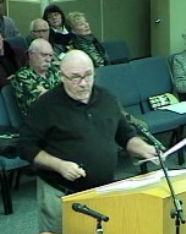 Jim Young Seniors Impact on Burlington’s Traffic Congestion:
There is universal agreement that traffic congestion is becoming a more serious issue in Burlington every year. As council strives to encourage continued growth and increasing population to ensure the economic well-being of our city this congestion will only become more troublesome and the economic and the environmental impact more acute. City Council recognizes this and addresses the issue in its Proposed New Strategic Plan (A City That Moves).
Seniors using affordable transit for one in five of their journeys would reduce traffic congestion by approximately 3%. While that may not sound like much, traffic flow science suggests such a reduction has a major impact on traffic flow and reduced commute times particularly at peak volumes. The more attractive any incentive to switch seniors from cars to transit, the greater that improvement will be. More seniors on transit allows working people, business transport and goods to move more efficiently, improving productivity, and supporting the vibrant business environment our city strives to encourage in that Strategic Plan.
Road Safety:
Studies indicate that as we age our cognitive abilities and response times deteriorate resulting in higher levels of traffic accidents, injuries and claims for senior drivers. The safety of senior drivers and their impact on accident rates is an emotionally charged subject we are loath to address for fear offending spouses, parents or potential voters.
Reduced transit costs for seniors would alleviate that burden by providing a dignified and affordable alternative to driving; thereby reducing the risks with all the human and monetary costs involved for their families, the city, traffic authorities and emergency services.
Reducing traffic accidents by moving seniors from automobiles to transit would also go a long way to meeting the city’s Age Friendly City and a Safe Place to Live objectives of its Proposed New Strategic Plan.
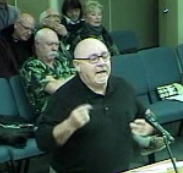 Jim Young The Environment:
Thirty Thousand Burlington Seniors driving an average of 15,000 Kilometers per year, even allowing for some spousal car sharing, emit 105,000 tons of CO2 into the atmosphere. Every car taken off the road by affordable transit for seniors reduces this annual amount by 3.5 tons.
Again, the Proposed New Strategic Plan aims to make Burlington a Greener Place to Live: an admirable objective for our city that we can help achieve by switching seniors from automobiles to transit and reducing our carbon footprint.
Jim Young has lived in Burlington for more than 30 years where he raised his family and involved himself in his community. He still has a pleasantly strong brogue accent. This opinion pice is a delegation he made during the budget deliberations at city hall.

 By Pepper Parr By Pepper Parr
January 21st, 2016
BURLINGTON, ON
Robert Lovell doesn’t understand.
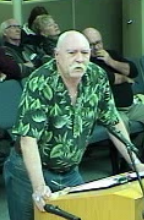 Robert Lovell He was interviewed for the job he has as a member of the Burlington Seniors Advisory Committee and thought he was expected to do just that – advise city council on things that mattered to seniors.
BSAC met on a number of occasions and went into the community to learn when people wanted in the way of transit services.
They researched what Oakville was doing and came to the conclusion that the Free Transit on Monday’s was a good idea and certainly worth trying in Burlington.
They then delegated to city council and made a strong case for trying the Free transit for seniors on Monday’s.
They argued that ridership would rise and the free service might convince people to try the bus. They argued it would also allow people with limited means to use the bus service more often.
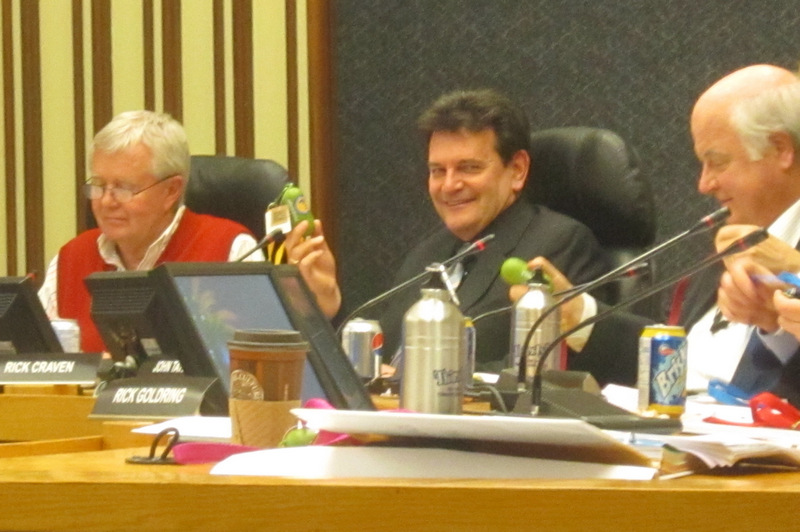 Councillor Jack Dennison, Rick Craven and John Taylor voted not to proceed with a pilot project to learn how much additional ridership could be added to the transit service. All three voted for an allocation of $15,500 for the car free Sunday event that takes place in wards 4,5 and 6. A majority of city council didn’t see it that way and they voted (4-3) against the pilot program that was to run for six months.
Councillors Marianne Meed Ward, Blair Lancaster and Mayor Goldring voted for the pilot program.
Councillor Craven said very little during the debate. Councillor Taylor seemed to feel that the program was intended for those who could not afford transit – and he argued, if that was the case, there were Regional programs that gave financial support.
Taylor seemed quite prepared to have people submit to a financial means test to get support to buy a transit pass. He saw the pilot project as social welfare which he explained is handled by the Region.
Councillor Dennison has never been in favour of much in the way of support programs. Councillor Sharman said he didn’t have a problem with the program but he wanted to be sure everyone fully understood just what the outcomes and expectations were for the pilot project. He wanted the Director of transit to set out what would be measured so that a proper evaluation could be done when the six month pilot ended.
Lovell said he had been told by friends that the Advisory committees were just a sham – that they were put in place to let the public think the city wanted to hear what they had to say. “If that is the case: said Lovell, “then I am out of that committee. I am interested in working on committees that want to make a difference.”
Lovell was one of three people who delegated on the Free Transit for seniors on Monday – a program that Oakville has had in place since 2012 where it is reported to have increased transit ridership by as much as 14% in one period.
Burlington Transit has always had difficulty growing transit ridership. There have been significant price increases which has depressed ridership and route changes haven’t helped all that much either.
When the matter got to council for debate it was clear that some of the members of council didn’t hear what the delegations were saying the day before.
Jim Young was asking council to forget the cost but focus on service – he argued that it was taxpayer’s money and the seniors wanted this kind of service.
What council failed to see was the real opportunity that was being missed. Burlington has busses that travel the streets “more than half empty most of the time” if we understood what Councillor Sharman says.
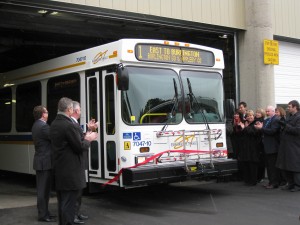 A new bus is added to the fleet – city hall staff and area politicians drove over to the transit garage to give a round of applause. They get paid for this – don’t they? We own the buses, we pay a driver to be behind the steering wheel – if there was a chance to increase the ridership at no additional cost and at the same time provide a service and entice people to use the buses – why wouldn’t one at least try the pilot?
The city wasn’t going to lose any money – there would be passengers on the bus who would not pay a fare – they wouldn’t have been on the bus anyway
There is an additional benefit if ridership can be increased. The gas tax rebate the province gives a municipality is based on two measurements: the population of the municipality and the ridership.
There are currently 130 municipalities sharing $332 million dollars.
There was an addition to the 2016 budget that was estimated to cost $14,000 – they spent more than an hour
Burlington has had problems convincing people to use transit. Doug Brown maintains the city does not have a plan to increase ridership and that there really isn’t anyone within city hall who will advocate for improving transit. There is no one at city hall who fully understands transit – responsibility for transit get mentioned by the people responsible for transportation.
More than 17% of the population is over 65 and while many people are able to drive their cars well into their 90’s our aging population is likely to become subject to graduated drivers licenses.
We will get to the point where a doctor will be required to advise the department of transportation that the patient is no longer capable of driving a car. What do we do when we have a growing cohort of people who are either not allowed to drive or are no longer comfortable driving?
The transit free Monday was an opportunity to learn if people would take a bus if it were free. The driving factor behind the pilot project was to see if this was a way to increase ridership.
Old school thinking had Councillor Taylor seeing the request as a social welfare issue, while Councillor Sharman wanted a clear understanding of what the expectations of the pilot were going to be.
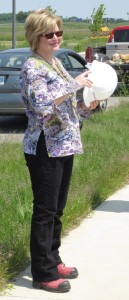 Ward 6 Councillor Blair Lancaster – voted for the Free Monday transit service for seniors 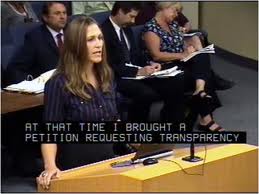 Ward 2 Councillor Marianne Meed Ward made her presence known to Council well before her election to office, the city knew what they were getting and she has delivered on that promise. Councillors Lancaster and Meed Ward were quite willing to let the Director of Transit take the time needed to prepare a report and if they had to move the start date of the pilot back a bit they could live with that as well. An amendment to the motion allowing for a report to be prepared didn’t pass either – the four opposed to the pilot project just didn’t want to see it take place.
When an item fails at the Standing Committee level there is always an opportunity to debate it again at a council meeting – these are usually held a couple of weeks later. However, budget meetings were slipped in and the normal rotation of meetings got jammed up. If there is going to be a change at city council – those who are behind this project will have to get a wiggle on.
The Gazette understands that the good folks in Aldershot are not at all pleased with the Councillor Craven vote against the pilot.

 By Staff By Staff
January 21st, 2015
BURLINGTON, ON
Two new exhibits that are certainly worth the time are on the Art Gallery of Burlington calendar.
Paul Mathieu has tuned into the reputation the gallery has for a magnificent ceramics collection. His work is exceptional.
 The China Syndrome – work by Paul Mathieu Paul Mathieu – The China Syndrome will be at the AGB from February 12, 2016 – April 10, 2016 in the Lee-Chin Family Gallery
A public reception takes place Thursday February 11, 6pm-8pm; the Artist Walk & Talk will be at 6:30 pm. Paul Mathieu will be in attendance
Internationally renowned ceramist and author Paul Mathieu has spent the last decade periodically returning to Jingdezhen, China to oversee the production of his ceramic works.
This exhibition traces his explorations ranging from the relationship between two and three dimensional form, to the portrayal of gender roles and gay identity. The artist’s role from conception to production is examined from both the artist’s and craft person’s perspective.
Dust, a ceramic installation by Grace Eun Mi Lee opened on the 16th of January and will run until April 17, 2016 at the Perry Gallery
The public reception is on Thursday February 11, 6pm-8pm
 Dust – suspended from the ceiling to create cloud-like mists. On display at the Perry Gallery Grace Eun Mi Lee is known for her ceramic installations. Numerous small pieces, often referencing the hidden world of microbes, are suspended from the ceiling to create cloud-like mists. On closer examination, these mists reveal the hidden world that surrounds us in our everyday lives. We are made to question the visible world and compare it to the unseen reality that goes on around us on a daily bases.
The Art Gallery of Burlington is located at 1333 Lakeshore Rd, Burlington, ON L7S 1A9
Gallery Hours:
Monday: 9:00 am – 6:00 pm
Tuesday – Thursday: 9:00 am – 10:00 pm
Friday – Saturday: 9:00 am – 5:00 pm
Sunday: 12 noon – 5:00 pm
Parking is available at the rear of the gallery.

 By Pepper Parr By Pepper Parr
January 21st, 2016
BURLINGTON, ON
What started out as a 3.85% increase in the tax rate for 2016 got whittled down to 3.15% at the end of a five hour budget meeting held at city hall on Wednesday.
The Performing Arts Centre got what they wanted, the seniors didn’t succeed in convincing the Councillors that free transit Monday’s was a good idea.
For the first time the public got some sense as to where the city manager ants to take the city of the future.
The disposition of the 2015 surplus was hotly debated – but for the most part those dollars are getting tucked into different reserve funds.
The way city hall is staffed is going to get a hard look and the city manager is going to issue mandate letters to his Directors.
The number of bylaw officers is going to change.
Plans for a program to collect data on the state of commerce in the down ton core got the chop- The Burlington Downtown Business Association (BDBA) was told they could pay for that task themselves.
And Councillor Jack Dennison actually went along with spending some money.
Councillor Sharman continued to hammer away for more data.
The Gazette will report in detail on each of these.
Council met as a Standing Committee – the decisions they made get approved at Council on Monday where they can be changed.


 By Pepper Parr By Pepper Parr
January 20th, 2015
BURLINGTON, ON
It was a different day for Rick Burgess who stood before the Community and Corporate Affairs Standing Committee explaining why funds were needed for two new positions at the Performing Arts Centre.
He got a decent hearing; the Mayor is onside – Burgess was heavily involved in the Mayor’s re-election campaign.
 Rick Burgess, the Mayor’s man. Paul Sharman, who sits on the Performance Centre Board didn’t seem opposed to the addition of the two people but didn’t seem all that keen on adding the cost to the Centre’s base budget.
There was a bit of banter back and forth about a how a Centre board meeting went – Sharman seemed to think the Centre should improve their revenue and pay for the new jobs out of those funds.
Burgess didn’t want to take that kind of risk – he wanted the dollars put into the base budget now and keep them there.
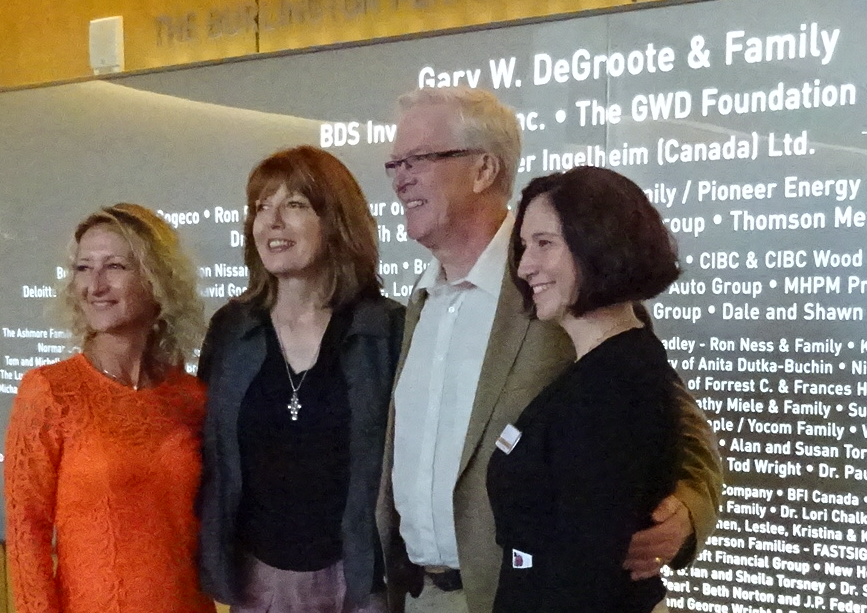 From the right: Performing Arts Centre Executive Director Suzanne Haines, retiring Executive Director Brian McCurdy who did a great job; Brenda Heatherington who opened the Centre and was the first Executive Director and Ilene Elkaim chair of the board. Suzanne Haines, coming along nicely as the Executive Director, appears to have broadened her role and is more involved in fund raising – even though there is a close to full time fund raiser on staff.
The public has yet to hear anything about what the fall program is going to look like – there hasn’t even been a hint.
Two years ago Burgess was getting a solid dressing down from this same committee when he pleaded for funds to cover the cost over runs and deficits that kept mounting. Council gave him the funds he needed then but it wasn’t a day that Burgess wants to remember.
He got the funding he needed then but the Performing Arts centre lost its Executive Director
Two Executive Director’s later and Burgess is back asking for additional funding – he wants the cost of a technician and the cost of a person to handle community engagement added to the Centre’s base budget.
Getting that additional funding isn’t going to be a slam dunk – there is far from a consensus among Council members that the Centre has earned the right to ask for additional support.
Last year was a good year – but it was not something Haines did – the good year – and it was a good year was made to happen by former Executive Director Brian McCurdy who resigned for personal reasons.
Haines is out in the community doing the networking and learning how culture works in this city and where the clout exists. She has a language of her own and talks of “animating” the place and making it more active.
There have been some small interesting changes. Haines needs time to get her footing and show what she is capable of doing. She has a supportive board and has come off a season that worked very well.
In her delegation to council Haines pointed out that curated performances grew from 30 to more than 100 and that there were 600 uses of the Centre.
 The Pat Methany performance was sold out – it was the day Suzanne Haines started her job as the new Executive Director. She said 100,000 people have bought tickets and added that in August the Centre will celebrate its 5th Anniversary.
There is a Culture Infrastructure Fund, either set up or being set up, that will have $100,000 put into it. The Gazette needs to dig into just what that fund is to be used for and which part of the cultural community will have access to it.
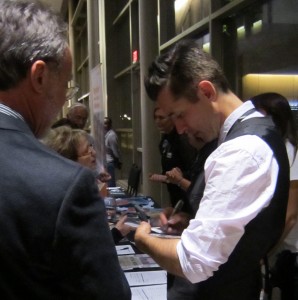 Royal Wood signing CD’s after the very first commercial event at the Burlington Performing Arts Centre. The Centre people along with its supporters seem to be saying that the first four years were a time when they learned what needed to be done – and that is part of the past.
McCurdy has shown that with strong management the Centre can get by on the close to half a million it needs in the way of ongoing support.
The Centre is always going to need financial support from the tax payers.
Whether they are going to get the support they need is something council will debate today and on Thursday.

 By Pepper Parr By Pepper Parr
January 20, 2106
BURLINGTON, ON
Every chance Doug Brown gets to talk about transit – he shows up. Brown is part of Bfast (Burlington’s Friends and Supporters of Transit) an organization that advocates for improved transit.
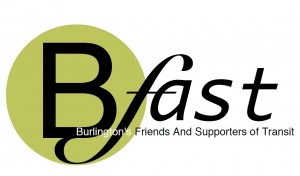 Brown is one of those people who tirelessly make delegation after delegation – he speaks with authority because he does his homework and has a good grip on transit facts and figures. Brown is one of those people who tirelessly make delegation after delegation – he speaks with authority because he does his homework and has a good grip on transit facts and figures.
More often than not, Brown will complete his delegation and Council doesn’t ask a single question. Brown turns away from the podium quietly and returns to his seat.
He must have been pleased to listen to the delegation that Robert Lovell and James Young made supporting the proposal in the budget review document that transit be free to senior citizens on Monday’s.
Brown however was surprised and disappointed to see that the budget for transit in 2016 was the same as it was in 2015 – which from Brown’s vantage point meant they were getting less because there was no allowance for inflation.
 Doug Brown and Susan Lewis look over a 1982 copy of the city’s bus schedule. It is worse than that according to Brown. The province gives municipalities a portion of the gas tax they collect. The funds the municipalities get is based on a formula that includes population and ridership. the municipalities get is based on a formula that includes population and ridership.
Burlington has a population that grew a bit – but transit ridership was less in 2015 than it was in 2014 which meant we got less in the way of that gas tax funding . .
 Doug Brown, chair of Bfast, wants to see more funding for transit and the development of a long term transit plan. Brown has been toiling away as an advocate for better transit but quietly says: “We have a long way to go” and point to Waterloo which has a council that understands the need for good, reliable, affordable transit.
Waterloo has a population of 97,475 – Burlington has a population that is at the 173,000 level. They can develop a progressive transit system – why can’t we?
Brown points to the city’s Official Plan and the Strategic Plan that calls for a modal split that has 11% of the transportation choices being transit. We are currently at 2%.
Free student passes are also something Brown would like to see.
If the amount of gas tax Burlington gets from the province is based on ridership – would it not make sense to boost ridership?

 By Pepper Parr By Pepper Parr
January 19th, 2016
BURLINGTON, ON
It was delegation time, the occasion when different community groups get their ten minutes to wrangle with council to advance their different causes.
This time it was transit for seniors, transit and the lack of a master plan and two positions the Performing Arts wanted to fill and have added to their ongoing budget.
The Performing arts matter will get covered in a separate story.
Two very effective speakers wanted to see the idea of free Monday transit for seniors make it into the 2016 budget.
Which seniors need the free transit was the question that occupied the minds of many of the council members.
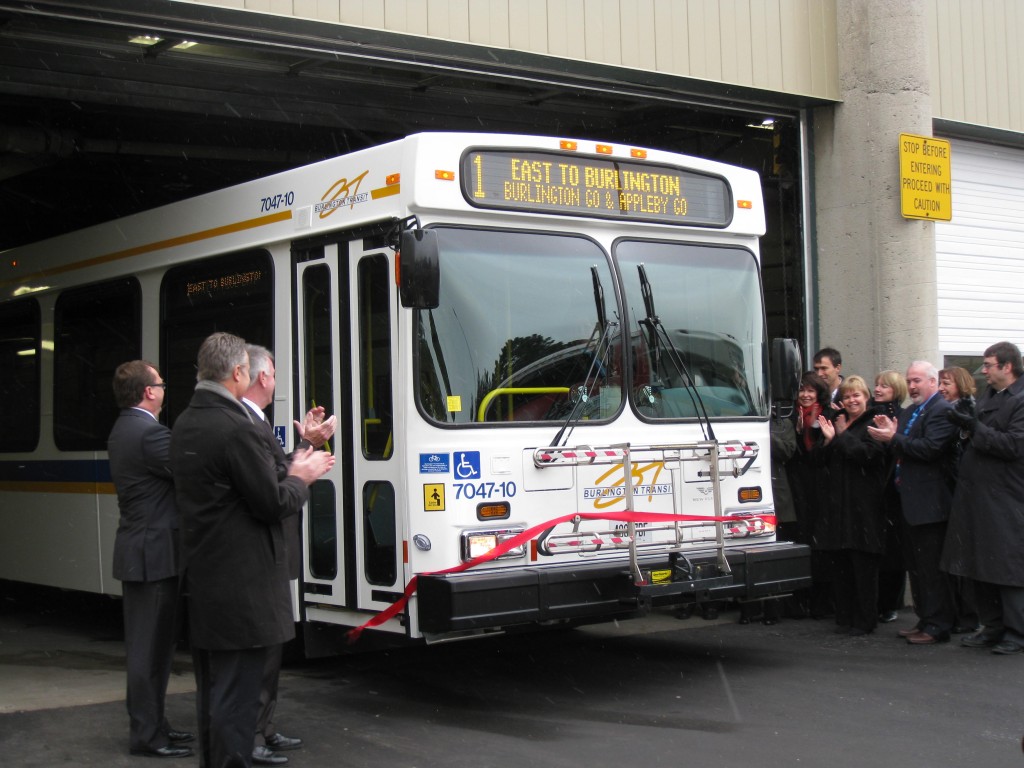 Imagine a bus service that is free to senior’s on Monday’s – it just might happen. Every senior responded both Robert Lovell representing the Burlington Seniors’ Advisory committee and James Young, a word 1 resident who spoke to the plans for transit fares for seniors.
In Burlington delegations are usually a one way street – the delegations speaks but for the most part doesn’t often engage the members of council.
There are many occasions when a delegation doesn’t get asked questions.
When Councillor Craven is chairing the meeting – delegations are kept to very few words. Not that way when Councillor Lancaster is the chair.
Robert Lovell was asked questions and council got much more in the way of an answer than they expected when Lovell pushed right back. Lovell wanted to see Burlington adopt the free Monday transit for seniors that Oakville uses and he kept chiding Burlington’s council members for not doing what Oakville has been doing since 2012.
The two delegations were both seniors – they were there to see that the senior’s in the city got what they felt was needed. Lovell talked of people who were not able to get out of their homes because they couldn’t afford the cost of transit.
“These people get isolated and there mental health deteriorates”, he said.
Mayor Goldring and Councillor Dennison wanted to know what percentage of the senior population lived on the $12,000 a year Lovell had referred to; he wasn’t able to say but he had a petition with more than 500 signatures.
The short delegation session Tuesday afternoon was all that was needed to handle the delegations that were made. It isn’t clear if no one asked to delegate in the evening or if the city decided it was not going to hold an evening session. So much for an engaged city.
Councillor Lancaster said in her opening remarks there was lot of consultation. There was just the one public meeting held at Tansley Woods last week.
In contrast the Strategic Plan has been put before five different public meetings as well as a very detailed on line questionnaire.
For some reason people in Burlington just accept how much their council decides to tax them.
 Parents at a hockey game while three people next door were listening to a budget presentation. It’s just who we are. In 2015 there was a public meeting that focused on the budget held at Mainway Recreation Centre; it was a winter night – less than three people showed up – next door at one of the skating rinks less than 20 yards away there were several hundred parents watching a hockey game . .
Did they know there was a public meeting to review and comment on the budget? The city does advertise the events – and the Gazette certainly spread the word.
 In 2014 – an election year people showed up for the budget review. In 2015 it snowed and there were just three people in the room plus two people who had run in the last election and were keeping tabs on the council they were not part of – this time. There have been other public budget meetings that were very well attended – however the more active citizens complained that the budget decisions had already been made – all the city was doing was explaining what they had decided to do.
There are those who think the public should be at the table helping to decide what and where their tax dollars are to be spent. And that was certainly what Robert Lovell and James Young were suggesting council do – take a much different look at transit. Make it free for seniors every day of the week suggested Young. “That’s what they do in Europe” he said. “You are looking at transit as a cost when you should be looking at transit as a service that is paid for with money the taxpayers give you”, he added. the taxpayers give you”, he added.
Several members of council wanted to know how many really poor seniors there were in the city that needed financial support to be able to use the transit system. The figure was said to be 6%. support to be able to use the transit system. The figure was said to be 6%.
Mayor Goldring pointed out that 17% of the population is made up of seniors – he seemed to be worried that they all might want to get on a bus on the Monday’s when service would be free – which is exactly the point Lovell and Young were making.
There comes a time pointed our Lovell when you lose your license – what do you do then? The frequency of the bus service really limits how much you are going to be able to get around. If the service were free and frequent you would have people out of their homes spending money , going places and being active in the community, said Lovell , going places and being active in the community, said Lovell
The Mayor, who said he was a senior, one of the younger set – but he does hold a membership at the Seniors’ Centre, told the delegation that he was once carded and asked to prove he was a senior.
The Mayor’s concern was with how many seniors the city will have in 25 years and how a city would manage to deliver the services they will need. The challenge is to develop plans today that will provide the services needed.
One thing became very clear Tuesday afternoon at city hall – if Robert Lovell is representative of the baby boomers who are entering retirement city councils of the future had better be ready for some very local people who expect much more in the way of services And they are not going to be quiet or docile.
Joan Gallagher Bell spoke of a new vision for an age friendly city – for her the minimum was the free transit on Monday.
And that was what Councillor Meed Ward had put forward an adjustment to the budget to make the free service available this year.
Cost – no one was sure but $40,000 seemed to be the number. James Young pointed out that it wasn’t a real expense – it was just revenue the city wasn’t going to get.
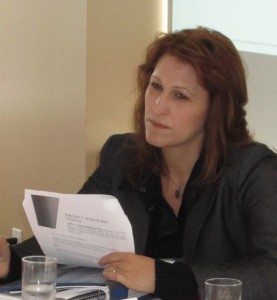 Councillor Meed Ward just might deliver a real benefit to the senior citizens with this budget. There is a side bar to this event. More than a year ago – on a December 18th of 2014 when city council was deciding who was going to sit on which committee, Meed Ward represented the city on the hospital board and she very much wanted to retain that committee responsibility.
Her colleagues didn’t see it that way and gave that task to Councillor Sharman and gave the job of representing council on the Seniors Advisory Committee to Meed Ward. of representing council on the Seniors Advisory Committee to Meed Ward.
Meed Ward has delivered big time for the seniors – she will be rewarded when she decides to run for a different role on city council in 2018. when she decides to run for a different role on city council in 2018.

TO:  Burlington Community and Corporate Standing Committee Burlington Community and Corporate Standing Committee
FROM: Tom Muir
Subject: City Budget 2016
Tom Muir wasn’t able to get to the Standing committee and his schedule didn’t allow him to get to the one public meeting held to “inform” the public abouit the contents of the Operating budget. So he took to the media that is open to every opinion out there and sent the following to the Clerk of the Standing committee to have his comments put on the record. Council tends not to listen to Tom Muir.
Councillors;
Since residents did not enjoy city public engagement on the budget, but have just been informed of spending and taxing plans, I have had to spend significant time finding a focus of my concerns.
It’s far to much to cover all the details, however, the big picture over the 20 year forecast is of particular note and concern to me.
1. The compounded average tax rate increases will double the tax take before the forecast period of 20 years is elapsed. Use the rule of 72 to figure that out. The average tax rate increase over the entire period is 3.62% and this leads to the doubling over 20 years.
Using the example bungalow residence in the budget document, the city tax take will go from $1415 to $2854.
If the other tiers of the total tax burden go up as well, the total tax bill could go from $3410 to $6878.
I have to ask you to ask what residents and businessmen think about that exponential curve trend upwards of this tax burden?
Can business double the price for goods and services over the same time period?
I hope your net income is increasing by more than 4% a year for the next 20. Mine is not.
Is this really raising taxes in an affordable manner?
This is really inflationary, in fact, and is shifting income from residents and business to the city for them to spend.
It seems like Council isn’t really thinking about this cumulative trend, in and of itself, and the consequences, at all.
No comment or request in the budget papers that I saw.
And residents were not asked what they thought, they were not “engaged”, just “informed” – this is what we are doing and here’s the tax take.
I would like to see Council pay a lot of attention to this trend. We need Council to tell the Managers to find the cuts needed to shave this to the inflation rate. And don’t tell me there’s no fat to be found.
Tell them a doubling of city taxes over the next 20 years is not to be tolerated.
2. Regarding the 2015 surplus reported, this $4.75 million is 3.23% of the net tax levy of almost $147 million. Taking $3 million of this and subtracting it from the tax levy, would bring the increase down to about the 2% inflation the city claims.
From the of view of the residents and business people, adding all of this to reserves is akin to adding more fat to the city finances. We don’t need fat there, as the reserves look fat as they are.
I see no explanation of some disaster lurking.
The 20 year trend of exponential tax increases that double the tax take, also has fat, for sure, somewhere, but while there are certainly some Councilor requests for amendments and some cost cutting, overall Council doesn’t appear to have asked Management to go find sufficient cuts needed to stay within inflation.
Here’s another pot of money, paid last year by residents, but not spent, that I am sure residents would agree could help reduce this years increase to something more like the “affordable” the city says is the number 1 goal – inflation.
Let’s see some talk and action about this, please.
I’m retired, and I have to live within my income, which certainly doesn’t increase by this much. I’m told business taxes are already high, so we are all in the same boat.
Management makes do with what Council tells them. It’s their job to find cuts. Tell them to.
 Aldershot resident Tom Muir is usually direct, at times abrasive and always looking for clear answers. When I worked in government, that’s how things were done, just find the cuts, and there were and are no sacred cows.
Certainly, not everything in the budget is needed in the time stated. What’s done is a function of input and time. The first can be reduced some and the time to completion can be extended. Put off spending now to save some. Elementary things we are supposed to teach children about money management.
If the city wants affordable tax rates for residents and business then get going on dealing with the exponential trend that will never deliver such a thing – only a crunch.

 By Pepper Parr By Pepper Parr
JANUARY 19th, 2015
BURLINGTON, ON
The report to council set out how the treasurer thought the surplus from the 2015 budget should be used. A cool $4,750,000 that was not spent in 2015 will not get returned to the taxpayers – it will get tucked into various reserve funds and saved for those rainy days.
 The surplus came from money budgeted but not spent on city services and significant improvements on revenue the city was able to pull in. We overspent on corporate expenditures. The numbers are in millions. Where were the savings experienced?
The city treasurer reports that expenses were closely monitored in 2015 to find ways to reduce operating costs; she reports the 2015 retained savings as follows:
• Human Resource Savings
City human resource costs (excluding winter control) are projected to have a favourable variance of $1,555,230. (The treasurer uses the term favourable and unfavourable balances which most of us know as a surplus and deficit.)
The city experienced a large number of vacancies throughout the year, some of them for senior positions. The favourable variance is primarily attributed to the period of time from when the position became vacant to being filled after the competition was complete.
• Earnings on Investments
Investment income is projected to exceed expectations by $1,327,017. This positive variance is attributed to $2,287,375 of realized capital gains, of which $960,358 will be used to meet the budget of $5.1 million. The proposed budget for Earnings on Investments for 2016 has been increased by $100,000 to $5.2 million.
• Supplementary Taxes
Supplementary tax revenues exceeded budget by $1,885,369. This is due to one property with three high rise buildings assessed as multi-residential for 3 years of taxes (2013-2015) totaling just over $2.0M in city revenues in 2015.
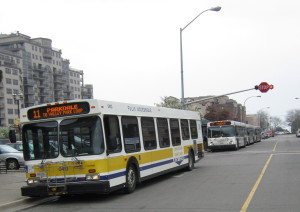 The city saved on the cost of fuel – but the projected bus ticket sales target was not reached. Transit is going to be an ongoing cost that the city does not seem to be really prepared for – where is the problem? • Transit Fare Revenues
Transit fare revenue is projected to have an unfavourable variance of $719,870 as a result of the 2015 budget not being in line with actual receipts. The proposed 2016 budget has been decreased by approximately $592K to $5.1 million to better reflect the actual trend.
• Diesel Fuel Costs
Diesel fuel costs are projected to have a favourable variance of $643,572. The majority of the variance is found in Transit.This variance is mainly attributed to lower than anticipated fuel prices.The proposed budget has been decreased by approximately $110K for 2016 to $2.9 million.
The remaining difference in the retained savings is comprised of favourable and unfavourable variances spread across numerous programs within the city. The 2015 Operating Budget Performance Report will provide more details on these program variances.
Consistent with past practice and recognizing the one-time nature of the retained savings, this report recommends a transfer to provide flexibility for addressing future one-time expenditures.
The retained savings is not to be used to directly reduce the proposed 2016 tax increase. As this is a one-time funding source, it is important that there is no reliance on retained savings built into the budget process on an ongoing basis.
2015 Recommended Retained Savings Disposition
• $738,361 Provision to Tax Rate Stabilization Reserve Fund
It is recommended that $738,361 be set aside to finance one-time expenditures included in the 2016 Proposed Operating Budget. This allows unique one-time needs to be addressed without affecting the tax rate and without being built into future budget years. These one-time expenditures will be addressed through the review of the 2016 Proposed Operating Budget.
• $750,000 Provision to Capital Purposes Reserve Fund
In order to meet future funding challenges and for the city to support its vision for implementing priority capital projects, staff recommend that $750,000 be allocated to the Capital Purposes reserve fund. This will provide funding for unforeseen requirements for approved projects, funding related to potential future federal/provincial programs and the accelerated road renewal program approved by Council. The 2015 balance for the Capital Purposes Reserve Fund is $9.5 million.
• $750,000 Provision to Strategic Land Acquisition Reserve Fund
The $750,000 provision will assist in replenishing the reserve fund for future strategic land needs. The 2015 uncommitted balance in the Strategic Land Acquisition Reserve Fund is $908K.
• $750,000 Provision to Information Technology Renewal Reserve Fund This provision will provide funding for life-cycle renewal of Information Technology infrastructure.
• $500,000 Provision to Insurance Reserve
In order to maintain a sufficient balance to cover both premium and deductible expenses, it is recommended that funding be allocated to this reserve. The 2015 balance is $663K.
• $500,000 Provision to Benefits Reserve Fund
It is recommended that $500,000 be transferred to the Benefits Reserve Fund to help replenish the balance which is currently $1.2 million.
• $500,000 Provision to Policy Initiatives Reserve Fund
In order to support resource requirements to finalize the Official Plan and other related studies.The balance is currently $100K.
• $250,000 Provision to Severe Weather Reserve Fund
This will help stabilize future budgets when major storms dramatically impact the operating budget.
The balance in the Severe Weather Reserve Fund is currently $2.8 million. It is recommended that the City target a one-year budget for the Winter Maintenance (which is approx. $4.6 million). .
• $11,639 Provision to Tax Rate Stabilization Reserve Fund
The remaining amount of $11,639 to the Tax Rate Stabilization Reserve Fund.
Prior to the calculation of the preliminary 2015 year-end retained savings, staff estimated any minor accounts payable, year-end accruals, and any year-end transfers for net zero activities that needed to be made as part of the year- end close process. The following are the estimated year end transfers for net zero activities.
  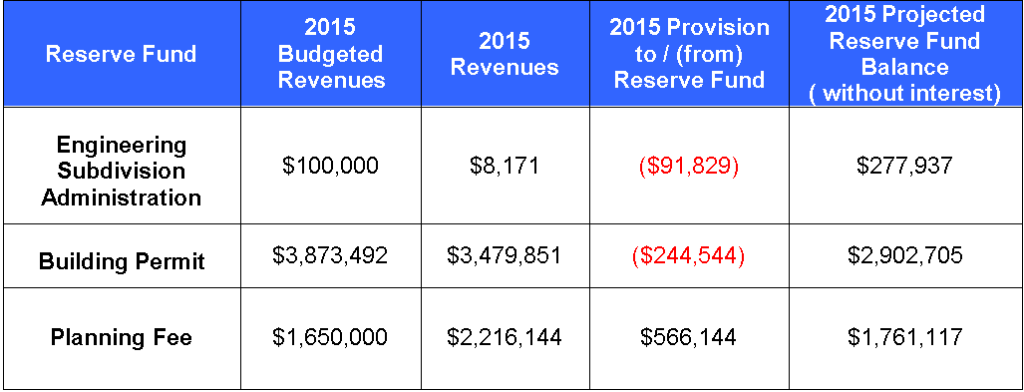
DAAP Reserve Funds
In 2005, the Engineering Fee Stabilization Reserve Fund, the Building Permit Stabilization Reserve Fund and the Planning Fee Stabilization Reserve Fund were created to ease budget pressures should development revenues slow down due to economic and/or market conditions.
The table below shows the projected year-end transfers included in the the calculation of the 2015 preliminary year-end retained savings.
• Engineering Fee Stabilization Reserve Fund
The decrease in Subdivision Administration Fees has resulted in a draw of
$91,829 from the reserve fund. Residential development in Burlington has changed from large-scale Greenfield subdivision applications, to small-scale, infill and intensification sites requiring OPA, zoning, site plan and condominium approvals. The proposed 2016 Budget for Subdivision Administration revenues has been flatlined to $100,000 and will be gradually reduced to zero over time using the $275,000 in the Reserve Fund.
• Building Permit Stabilization Reserve Fund
The Building Permit revenues for 2015 are $3,479,851. These revenues are offset by expenditures (both direct and indirect as per the Bill 124 model), with the resulting draw from the reserve fund of $244,544.
The proposed 2016 Budget for building permit revenues have been increased by
$98,770 to be in line with the 3 year average 2012-2014.
• Planning Fee Stabilization Reserve Fund
Planning Fee revenues have a favourable variance of $566,144 mainly due to increases in official plan and rezoning revenues. A provision of $566,144 has been made to the Planning Fee Stabilization Reserve Fund.
The proposed 2016 Budget for planning revenues has been increased by $45,000 to $1,695,000 to be in line with the 3 year average 2012-2014.
Budgeting is part science and part dealing with the unknown. Set out below is what the city experienced between 2011 and 2015.
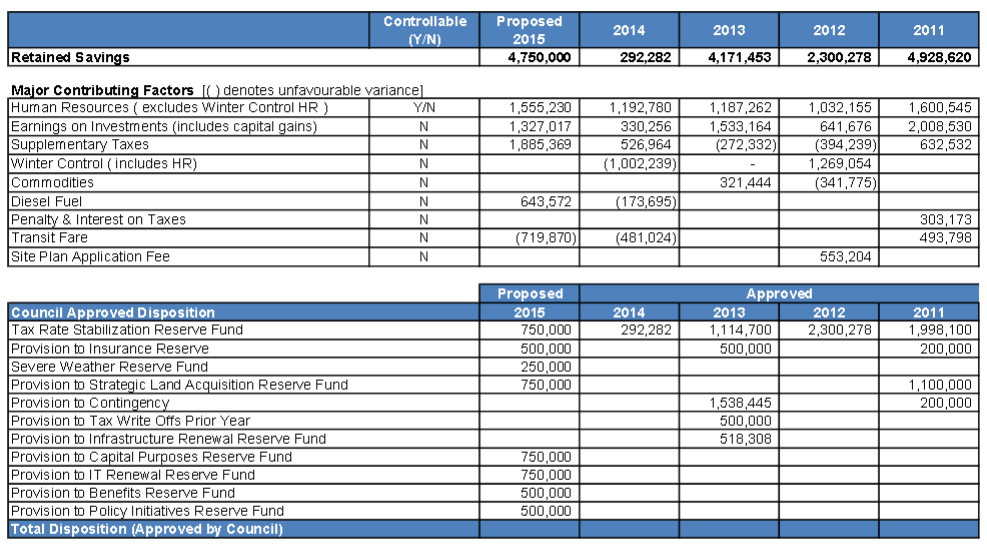 Top portion of the report shows where the surpluses came from – bottom shows what city council decided to do with the surplus. 
 By Pepper Parr By Pepper Parr
January 19TH, 2016
BURLINGTON, ON
There isn’t going to be a Lowville Winter Fair this year.
City hall has moved the funds that were used in the past today for the event and put them into the Love My Hood project which is a program that allows any neighbourhood to approach the Parks and recreation department with an idea and ideally get the support they need.
 If there is going to be any marshmallows and hot chocolate it will be at a local rink event. Not in Lowville.  You can still toboggan at Lowville – but there will not be an organized Winter Fair this year. Parks and Recreations has come to realize that most communities know what they want and don’t have to be spoon fed.
Love My Hood is a pilot project to build a healthier Burlington by engaging and empowering residents to come together and provide events celebrating their Burlington neighbourhoods.
 Love My Hood helps residents bring events to all neighbourhoods throughout the city by supporting and encouraging Burlington residents to hold their own neighbourhood gatherings, activities or projects where neighbours can get to know each other. Love My Hood provides resources, support, guidance and eliminates some common barriers in event hosting. Love My Hood helps residents bring events to all neighbourhoods throughout the city by supporting and encouraging Burlington residents to hold their own neighbourhood gatherings, activities or projects where neighbours can get to know each other. Love My Hood provides resources, support, guidance and eliminates some common barriers in event hosting.
There were 13 love My Hood events in 2015 – Parks and Recreation wasn’t prepared to say how many they hoped for in 2016 but they are aiming for 150 of them in 2017 – why 150? 2017 is Canada’s 150th anniversary of Canada.
Want to know more about creating an event for your neighbourhood? Contact Burlington Festivals and Events Office. LoveMyHood@burlington.ca
As for winter activities – the city now has 18 local skating rinks and they felt that Love My Hood programs could be developed around the rinks.
Lowville doesn’t have a local rink – thus – no Lowville Winter Fair. There was some talk about the Lowville community putting on an event – if they do it will be more local and not something that hundrds of people trooped up to Lowville to take part in.
Is this an opportunity lost? It will be interesting to hear what ward 3 Councillor John Taylor has to say on this.
Stay tuned for some comment from him.
In the meantime – if you want to do something for your community – fill in an application form at:
There is all kinds of information on this new approach the city has taken to empowering neighbourhoods and letting each community design programs it wants. Log into for more details.

 By Staff By Staff
January 19th, 2016
BURLINGTON, ON
On Sunday January 17th 2016 at about 7:20 AM, a patrol officer observed a male pull on door handles to several motor vehicles in the area of Elizabeth Street and James Street in Burlington.
 Upon seeing police, the male took off running and was captured after a foot chase where he became assaultive towards the officer and managed to break free. A second foot chase ensued after which the male was successfully arrested. Upon seeing police, the male took off running and was captured after a foot chase where he became assaultive towards the officer and managed to break free. A second foot chase ensued after which the male was successfully arrested.
The male was found to be in possession of a large quantity of assorted coins and a small amount of marihuana.
Arrested and held for bail is:
Willis Lucas Andrew ENRIGHT (18-yrs) of Hamilton
Charged with:
• Theft under $5000 (three counts)
• Possession of property obtained by crime under $5000
• Possession of a controlled substance (marihuana) under 30 grams
• Fail to comply with recognizance
• Assault with intent to resist arrest
• Escape lawful custody

|
|

















































































